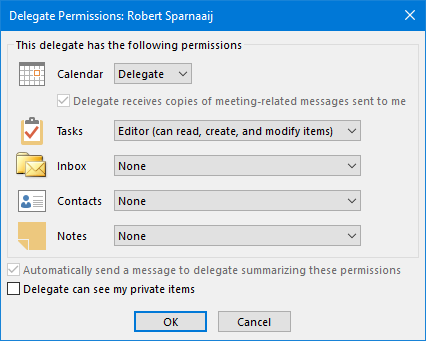Delegate Not Receiving Calendar Invites – Note: If you use Microsoft Outlook to delete items from another user’s mail folder to which you have delete rights, and the deleted items go to the Deleted Items folder instead of the Mailbox Owner Deleted Items folder.
You can use the DelegateWastebasketStyle keyword found in the following script to change the behavior. Here at Business Tech Planet, we’re really passionate about making technology make sense. In a world where businesses are using technology more than ever, it’s important that you understand the technology you’re using.
Delegate Not Receiving Calendar Invites
 Source: www.msoutlook.info
Source: www.msoutlook.info
We created this blog to share our knowledge and simplify technology, so you can use the best technology available in your business. It is possible that even if the delegation permission has been revoked, the assistant may still have the items sent to their manager unexpectedly.
Check For Hidden Inbox Rules
In this article, we look at some places that are likely to pass these things on to a former agent. If the delegate has been granted the right to view private calendar items, a hidden rule is created in the delegate’s mailbox.
When an agent is removed from the calendar, you must remove the hidden inbox rule. However, it is possible that the hidden inbox rule did not do so when the delegation was removed. Share only with others.
Send me alerts. Meeting requests and responses are sent to you and your representatives. Only your delegates will see the option to accept or decline the meeting request, and the message sent to you will appear as a regular email.
You can still reply to the meeting by opening the calendar item and replying. Gareth is a Microsoft MVP specializing in Exchange and Office 365. Gareth also contributes to the Office 365 for IT Professionals publication, which is updated monthly with new content.
More Information On Using The Eac Powershell To Stop Delegates Receiving Meeting Invitations In Outlook
Find Gareth on LinkedIn, Twitter or Facebook. @Willard Martin – While I wish I could “train” some of the VIPs and high level assistants, it won’t happen as my team desk is less than 100 meters from the master offices a company…they moved.
in the same building as our data center as it is the newest building on our corporate campus. We have to wear ties for Pete’s sake … Note: If you want copies of meeting requests and responses to be sent to a delegate, make sure the delegate is assigned an editor (can read, make, and change items) in the calendar, then select Host.
copies of messages related to meetings sent to my mailbox. Hidden inbox rules are not visible to the user in Outlook. Only an Exchange administrator can search for hidden inbox rules. You can check the hidden inbox rule with the Get-InboxRule command and by using the “IncludeHidden” parameter.
The MessageBox parameter specifies the agent, not the agent. An example of this command is below. I have your solutions now, much appreciated! ? Now if you have an idea how to stop this behavior, and explain it to me quickly, let me know.
 Source: www.sherweb.com
Source: www.sherweb.com
Change Delegate Access To Private Items
help ? After you’ve given someone access to your calendar, you’ll see another option in Sharing and Permissions that lets you control how meeting requests and responses work. If you have multiple agents, this option will work for all of your agents.
You can use Outlook on the web for business to give someone in your organization permission to manage your calendar. You can give them editor access, which allows them to edit your calendar, or grant access, which allows them to not only edit your calendar, but also schedule and respond to meetings on your behalf.
This issue occurs if the meeting requests were incorrectly processed in the user’s mailbox and delivered to the user’s Deleted Items folder instead of the Inbox folder, or if the meeting requests were incorrectly processed as if the agent had been established.
Calendar items marked as private are protected. Most people you share your calendar with only see the time of items marked private, not the title, location, or other information. The exception to this is that you can give the agent permission to see the details of items marked Private.
Important Legal Information
If the agent needs permission to only work with meeting requests and responses, the default permission settings will suffice, such as the agent receiving copies of meeting-related messages sent to me. You can leave the inbox permission settings at None.
Meeting requests and responses are delivered directly to the agent’s inbox. The Exchange Admin Center (EAC) PowerShell has a very powerful feature that allows one or more people to prevent agents from accepting email invitations for another Exchange mailbox.
Send which allows the user to send a message as if they were the owner of the mailbox. With or without agent access, Send As permissions can be used. The recipient will only see the manager’s name next to From if Send permissions are enabled.
This role must be configured by the Exchange administrator or Microsoft Windows. In the case of an Exchange mailbox, for example when an employee sends emails to clients from a shared Exchange mailbox instead of from their own Exchange account, this situation is very common.
What Does Delegate Access Do?
That person has now been removed from the list of people who have access to your calendar. If that person is in your organization, your calendar will be removed from their calendar list. If that person is outside of your organization, the copy of your calendar will not be removed, but they will no longer be linked to your calendar or receive updates.
Saajid Gangat has been a researcher and columnist at Business Tech Planet since 2021. Saajid is a professional technology writer with expertise in web and graphic design and has extensive knowledge of Microsoft 365, Adobe, Shopify, WordPress, Wix, Squarespace, and more.
 Source: i.ytimg.com
Source: i.ytimg.com
! You can connect with Saajid on Linkedin. Author With this permission, the agent can read and create things and modify and delete things that he has created. For example, an agent can create task requests and meet requests directly from the Task or Calendar folder and then submit the item on your behalf.
When an assistant no longer needs access to their manager’s calendar, they can be removed as a delegate. The administrator can do this through the Outlook client or the Exchange administrator using PowerShell. When their submission rights are removed, all access to the calendar is revoked.
Additionally, meeting invitations are no longer sent to the agent to accept or decline. After you’ve given someone access to your calendar, you’ll see an option under Share this calendar that lets you control how meeting requests and responses are handled.
If you have multiple agents, this option will work for all of your agents. If the user does not have an online profile, create one. Or,from the Tools menu, select Options and ensure that both the Use MBD_ONLINE flag when calling OpenMsgStore and the Use MAPI_NO_CACHE flag when calling OpenEntry check box are selected.
Note! When an agent responds to your invitation on your behalf, you will not see the invitation response in your inbox when using Outlook online. Appointments that are accepted or tentatively accepted will appear in your calendar and indicate that your agent has accepted them.
Note! By default, the agent is given write access (can read, create and modify) to the Calendar folder. When an agent answers a meeting on your behalf, it is automatically added to your calendar folder. Note!
Calendar items marked as private are protected. Most people you share your calendar with only see the time of items marked private, not the title, location, or other information. The exception to this is if you select the Allow agent to view private events check box.
Once you’ve added the person you want to share your calendar with and you’ve selected permission to share with them, select Share. If you decide not to share your calendar now, select Remove. As a contributor, you decide what level of access the delegate has to your folders.
You can grant permission to read the contents of your folders or to read, create, modify and delete items. By default, when you install a proxy, the proxy has full access to the Calendar and Tasks folders.
An agent can also respond to meeting requests on your behalf. Just like having an assistant help you manage your paper inbox, another person, known as an agent, can receive and respond to email and meeting requests and responses on your behalf.

You can also give the agent additional permission to read, create, or modify items in your Microsoft Exchange Server mailbox. That person has now been removed from the list of people who have access to your calendar.
If someone is in your organization, your calendar will be removed from their list of calendars. If that person is outside your organization, the copy of your calendar will not be removed, but they will no longer be linked to your calendar or receive updates.
This can happen if the Receive folder for the IPM.SCHEDULE.MEETING message group is changed to the /Schedule folder or if the message property PR_RULE_MSG_PROVIDER with the IPM.Rule.Version2.Message message group is set to Schedule+ EMS Interface. You can give anyone in the organization editor or give access to your calendar.
Organizers can be assigned to your original calendar (called “Calendar”) or other calendars you’ve created. Agents can only be assigned to your primary calendar. You may not assign or delegate access to people outside your organization.
On the Sharing and Permissions page, type the name or email address of the person you want to share your calendar with. Although you can share your calendar with more than one person, you can only add one person at a time from Outlook on the web.
If the result returned Amy Pond as the user, we can remove those permissions with Remove-MailboxFolderPermission. For example, to remove all permissions for Amy from River’s calendar folder, we would issue the following command. The test result returns two records.
The first is from a user called Rory Williams. We see that Rory Williams has editorial rights to the River calendar. We also see a user named Default. It’s always the permission that users get unless they get express permission.
In the example above, Rory Williams would be given editor rights to River’s calendar, while all other users would see River’s free/busy information (access only). Amy Pond is unknown in this result, so you should only get free/busy information.
In this example, Amy is not an agent.
outlook delegate receiving meeting invites, stop receiving delegate meeting requests, stop receiving outlook calendar invites, delegate not receiving meeting requests, outlook calendar delegate meeting requests, outlook received for someone else, delegate not receiving meeting invites, delegate receiving meeting invites

